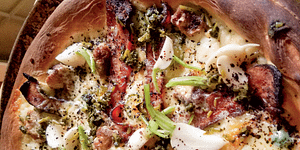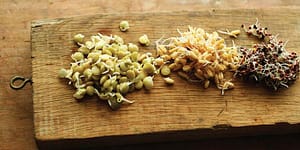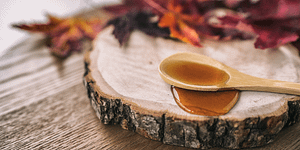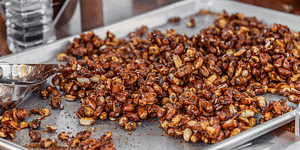The Power of Fermentation: A Bubbling Transformation

Fermentation revivalist Sandor Ellix Katz has spent a lot of time thinking about fermentation. Stemming from his personal obsession with all things fermented, in his newest book, Katz meditates on his art and work, drawing connections between microbial communities and aspects of human culture: politics, religion, social and cultural movements, art, music, sexuality, identity, and even our individual thoughts and feelings.
The following is an excerpt from Fermentation as Metaphor by Sandor Ellix Katz. It has been adapted for the web.
These are very scary and uncertain times.
The specter of climate change alone calls everything we have known into question: rising temperatures; melting glaciers; rising seas and shifting currents; more extreme weather patterns, with bigger, more dangerous storms, displacing growing numbers of people; less predictable agriculture with resulting crop failures; new vulnerabilities to pests and diseases; and a cascade of effects as yet unrecognized or unimagined.

Mold on neglected kombucha mother with stereoscope.
Mass extinctions are already occurring, and ecological balances are destabilized. Our insatiable appetite for resources not only accelerates climate change but also leads to deeper and more destructive extraction practices. Income inequality grows ever starker as technology and cheaper globalized labor replace workers. Racism and sexism persist, both in systemic structures, and spread and exploited by a growing politics of resentment.
The shocking jolt of the COVID-19 pandemic on all social, public, and economic life illustrates just how vulnerable our entire mass society is to disruption. In this case it was a virus that sent shock waves that have been felt everywhere, most acutely in densely populated cities. Sometimes society is disrupted by more localized phenomena, such as wildfires, floods, tornadoes, or earthquakes. Not to mention war, going on somewhere always, and in some places for protracted periods. For all these reasons and more, humanity is desperate for transformation.
Our way of life is proving to be unsustainable. We need to reimagine how we live our lives. Now more than ever, we need the bubbling transformative power of fermentation.
I definitely do not wish to suggest that the simple act of fermenting in your kitchen will save the world. I wrote in Wild Fermentation of fermentation as “a form of activism.” I stand by this notion, but not because there is anything inherently political about fermentation. People can be narrow in their focus, and often the reasons people ferment are specific, for example preservation of garden vegetables, or a desire to improve health, or the pursuit of compelling flavors.
The only thing that makes do-it-yourself fermentation radical is context: our contemporary system of food mass production, which is unsustainable in so many ways. Our dominant food system is polluting, resource-depleting, and wasteful, and what it produces is nutritionally diminished, causing widespread disease. Perhaps even more profoundly, it deskills and disempowers people, distancing us from the natural world and making us completely dependent on systems of mass production and distribution—which are fine as long as they function, but are vulnerable to many potential disruptions, from viral pandemics to fuel shortages or price spikes to war and natural disasters. Expanding local and regional food production, and in the process transforming the economy that goes along with it, is the only real food security.

Rice koji with scanning electron microscope. Copyright 2019 by MIMIC. Used by permission.
Food and food production are quite profound as we try to shift our relationships to the Earth and to one another. Food can be a means of building and strengthening community. Producing food is a very ethical way to channel one’s energy. You’re doing something productive and creating some sustenance for yourself and other people. Localizing food production stimulates local economies more broadly, by recirculating resources rather than extracting them. Getting involved in food production can also help us feel empowered and more connected to the world around us.
We must find ways to reorganize our society, to move from being driven by resource extraction toward a dedication to regeneration. I do not mean to sound preachy, here. I’m not entirely living what I advocate, so I can be viewed as a hypocrite. I mean, I fly more than almost anyone else I know in my fervor to share fermentation. And in my home life in a rural area, I drive almost everywhere I go. I greatly admire people who live their ethos and entirely eschew planes, or all fossil-fuel-driven transportation, but in my life I have defaulted to the path of mobility, like most.
We, including me, definitely need to slow down our mobility and along with it our expectations of growth. What we need is contraction: each of us leaving a much lighter footprint, with more equitable distribution of resources. We also need to shift from our focus on individualism to more cooperative, collaborative models for working together and mutual aid. I have no grand plan, and in our current corporate-dominated political system I’ve become skeptical of grand plans. But moving in this direction definitely involves getting more people plugged into the earth and life around us, the plants and animals and fungi and even the bacteria.
This is what food production forces us to do—to be more tuned into our environment. Certainly this is true of fermentation.
Recommended Reads
Recent Articles
Nothing says “spring” like a fresh, foraged meal! Savor the flavors of the season with this Milkweed Bud Pizza recipe.
Read MoreWhat’s so great about oyster mushrooms? First, you can add them to the list of foods that can be grown indoors! They are tasty, easy to grow, multiply fast, and they love a variety of substrates, making oyster mushrooms the premium choice. The following is an excerpt from Fresh Food from Small Spaces by R. J.…
Read MoreCraving something sweet? These delicious maple roasted nuts are the perfect treat to help you push through those end-of-winter blues. The following is an excerpt from Full Moon Feast by Jessica Prentice. It has been adapted for the web. The Magic of Maple: A Rich History Following the Hunger Moon, just before the first thaw…
Read More








